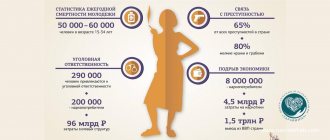What to do if you are accused of drug use?
If accused of using drugs, the actions of the accused will depend on whether the person actually used drugs or not:
- If a person has used drugs, then there is little point in denying this fact, since tests can be taken for the presence of drugs in his body, and, accordingly, this fact will be established.
Someone will say: “I will refuse to undergo the appropriate medical examination” - yes, the person has the right to refuse the examination, but in this case his actions will be qualified under Art. 6.9. Code of Administrative Offenses of the Russian Federation, which provides for liability for refusal of medical examination.
Thus, whether a person passes the tests or not, his actions for drug use will in fact be qualified according to the above administrative structure.
In order to avoid violation of the rights of the accused person, it is better to seek help from a lawyer as quickly as possible and agree with him on the position on the case and further actions.
- If the person has not touched drugs, then there is nothing particularly to be afraid of. You must remain calm and undergo drug testing.
However, it should be remembered that the accusation of drug use may not be without reason, so in such a situation you should also use the help of a lawyer who will help prove innocence:
What are drugs
Narcotic drugs have been known for a long time. In Ancient Greece, they brought a person into a stupor and numbness. In the modern world, medicine interprets them as psychotropic substances that put people into a stupor, relieving them of sensitivity to pain.
In jurisprudence, drugs are interpreted even more broadly. These include all prohibited psychoactive drugs that alter people's consciousness. Moreover, it does not matter what their origin is - natural or from synthetic substances.
Narcotic drugs are divided into 4 groups:
- Prohibited (hashish, heroin, marijuana).
- Drugs in small circulation that are strictly controlled (morphine, codeine).
- Psychotropic elements, their release is small, but they are not subject to strict control (aprofen).
- Elements used in the manufacture of narcotic substances, as well as various poisons (ephedrine, acetone).
The use of any group of drugs changes a person’s mental state. Drug addicts often use versatile chemical components called spices, which affect the entire body as a whole.
What is the penalty for drug use under the Criminal Code of the Russian Federation?
There is no separate offense for drug use in the criminal law. However, the Criminal Code of the Russian Federation provides for charges for possession, transportation, sale of drugs and others. Thus, a person who uses drugs and is detained by law enforcement officers with the corresponding substance in an amount, starting with a significant amount, will be prosecuted under one or another article of the Criminal Code of the Russian Federation.
If a person has organized a den or provides its premises for drug consumption, this will already result in liability under Art. 232 of the Criminal Code of the Russian Federation, the sanctions of which provide for punishment in the form of imprisonment for a term of up to 4, up to 7 years, taking into account the qualification of the actions of persons.
In a situation where a person himself uses prohibited substances and induces others to do so, he faces liability under Art. 230 of the Criminal Code of the Russian Federation. The maximum punishment, taking into account the qualification of actions for inducing drug use, is up to 15 years in prison.
INTERESTING: how much they give for drug use, read the link, and also watch a video on building a line of defense in a criminal case
Drug dens
The law has a provision on the basis of which the organizers of dens where drugs are used are held criminally liable. Surely readers have encountered such a problem when there is an apartment at the entrance of a building with suspicious individuals gathering in it every now and then. It seems that there is nothing to report to the police - there is no noise, no hooliganism, but the very appearance of such visitors and, perhaps, the specific smell from the apartment door indirectly indicate that there is a brothel here. In this section we will tell you what can be done in such cases, as well as about Article 232 of the Criminal Code of the Russian Federation, under which drug dealers can be prosecuted.
Literally, the term “den” means a place (premises) where people with criminal intentions gather, within the meaning of Art. 232 of the Criminal Code of the Russian Federation - with the intention to use a narcotic drug. Let us immediately note that according to the criminal legislation of Russia, liability can only arise from those who organized and/or maintain a brothel. That is, the actions of persons who visit the brothel will not constitute a crime, which does not exclude administrative punishment under the Code of Administrative Offenses of the Russian Federation.
Example No. 4 . Rakin R.R. regularly visited the apartment of Myskov N.G., who allowed desomorphine to be brewed (then used) in his apartment. When the police came to check at this address, Rakin, two other dependents and Myskov were in a state of drug intoxication - they were held liable under Art. 6.9 Code of Administrative Offenses of the Russian Federation, and Myskov N.G. – criminal punishment for maintaining a drug den.
Until 2013, according to Art. 232 of the Criminal Code of the Russian Federation, responsibility came only for the organization and maintenance of a brothel, and only 4 years ago the legislation underwent changes - the scope of responsibility also included the systematic provision of premises for the use of illegal drugs.
Contents of the stash
Content refers to the actions of a person to preserve and use the place he already has (not necessarily owns it) where drug addicts come. This could be payment of rent, utilities, cleaning - in a word, everything related to the actual use of the premises, most often residential.
The basis for holding someone accountable for providing premises (most often their own property) will only be confirmed repeated (more than two times) provision of their housing to addicts for the consumption of prohibited substances.
Organizing a hangout
Organization means finding a premises that is planned to be used for gathering drug addicts; it can be either residential or non-residential. This may also include incurring various expenses, repairs, installation of certain equipment for cooking mixtures (purchase of a stove, dishes, etc.). That is, organizing a den for drug consumption can be understood as fully providing amenities for drug addicts, starting with finding a suitable premises.
For liability purposes, it does not matter whether the actions of the organizer (holder) were selfish or gratuitous. In practice, one of the group of drug addicts allows others into his home for part of the dose, which he does not pay for. If the owner of the brothel supplies those who come to him, then he may have additional liability for the illegal sale of narcotic drugs.
As a general rule, the sanction of Article 232 of the Criminal Code of the Russian Federation provides for a punishment of up to 4 years of imprisonment , and in the case of guilt of a group of persons or an organized group, the maximum penalty is automatically increased to 6 and 7 years of imprisonment, respectively.
Administrative liability for drug use
Art. 6.9. The Code of Administrative Offenses of the Russian Federation is dedicated to responsibility for drug use. This type of liability occurs when a person uses drugs without a doctor’s prescription. Punishment can be imposed in the form of a fine in the amount of 4 thousand rubles. up to 5 thousand rubles or arrest for up to 15 days.
If drugs were used without a doctor’s prescription in a public place, namely, on the street, in a park, in a public garden, etc., then the person faces liability under Art. 20.20 of the Code of Administrative Offenses of the Russian Federation also imposing a fine in the amount of 4 thousand rubles. up to 5 thousand rubles or arrest for up to 15 days.
News
1/03/2018
On liability for the use and distribution of drugs
USE OF DRUGS, PSYCHOTROPIC SUBSTANCES,
without a doctor's prescription,
NEW POTENTIALLY HAZARDOUS PSYCHOACTIVE SUBSTANCES
(SPICES, SALT, MIXES) ARE PROSECUTED BY LAW!
Free circulation of narcotic drugs is prohibited on the territory of the Russian Federation.
CRIMINAL LIABILITY
For committing actions related to illegal drug trafficking, persons are held criminally liable, for foreign citizens - with a subsequent ban on entry into the Russian Federation until the criminal record is expunged or expunged.
For illegal acquisition, storage, transportation, or production of narcotic drugs, persons are subject to criminal liability under Article 228 of the Criminal Code of the Russian Federation, which provides for punishment of up to 15 years in prison.
For the illegal production, sale, and transfer of narcotic drugs, persons are held criminally liable under Article 228.1 of the Criminal Code of the Russian Federation, which provides for punishment of up to life imprisonment.
For the movement of narcotic drugs across the border of the Russian Federation, persons are additionally subject to criminal liability under Article 229.1 of the Criminal Code of the Russian Federation, which provides for punishment of up to 20 years in prison.
For inducement to consume narcotic drugs, psychotropic substances or their analogues, Article 230 of the Criminal Code of the Russian Federation establishes criminal liability and provides for punishment of up to 15 years in prison.
Since February 2015, the Criminal Code of the Russian Federation has established liability for the trafficking of new potentially dangerous psychoactive substances (salts, mixes, spices), the maximum penalty for which is up to 8 years in prison (Article 234.1 of the Criminal Code of the Russian Federation).
For involving a minor in the commission of a crime, Article 150 of the Criminal Code of the Russian Federation provides for liability for a term of up to 5 years in prison.
When assigning punishment, an aggravating circumstance is the commission of a crime while intoxicated.
If you voluntarily handed over narcotic drugs to law enforcement agencies and actively assisted the investigation, you may be exempt from criminal liability.
ADMINISTRATIVE RESPONSIBILITY
For the use of narcotic drugs or psychotropic substances without a doctor’s prescription or new potentially dangerous psychoactive substances of the Code of Administrative Offenses of the Russian Federation, liability is provided in the form of a fine in the amount of up to five thousand rubles or administrative arrest for up to fifteen days (Part 1 of Article 6.9 of the Code of Administrative Offenses of the Russian Federation).
For involving a minor in the use of new potentially dangerous psychoactive substances or intoxicating substances, Article 6.10 of the Code of Administrative Offenses establishes liability in the form of a fine of up to three thousand rubles.
In addition, administrative responsibility is provided for:
- evasion of diagnostics, preventive measures, treatment for drug addiction and rehabilitation in connection with the consumption of narcotic drugs or psychotropic substances without a doctor’s prescription or new potentially dangerous psychoactive substances (Article 6.9.1 of the Code of Administrative Offenses of the Russian Federation),
— propaganda of narcotic drugs, psychotropic substances or their precursors and new potentially dangerous psychoactive substances (Article 6.13 of the Code of Administrative Offenses of the Russian Federation),
- consumption of narcotic drugs or psychotropic substances, new potentially dangerous psychoactive substances or intoxicating substances in public places (Article 20.20 of the Code of Administrative Offenses of the Russian Federation),
Parents are subject to administrative liability in the form of a fine of up to two thousand rubles for the consumption of narcotic drugs or psychotropic substances, new potentially dangerous psychoactive substances or intoxicating substances by minors (Article 20.22 of the Code of Administrative Offenses of the Russian Federation).
For the acquisition, storage, transportation, production, processing without the purpose of sale, the use of narcotic drugs or psychotropic substances without a doctor’s prescription or new potentially dangerous psychoactive substances, foreign citizens are subject to administrative liability and deportation from the Russian Federation, which provides for a subsequent ban on entry into the Russian Federation for 5 years (Articles 6.8, 6.9 of the Code of Administrative Offenses of the Russian Federation).
For information: A person who voluntarily applies to a medical organization for treatment in connection with the consumption of narcotic drugs or psychotropic substances without a doctor’s prescription is exempt from administrative liability for this offense. A person duly recognized as a drug addict may, with his consent, be sent to medical and (or) social rehabilitation and, in connection with this, may be released from administrative liability for committing offenses related to the use of narcotic drugs or psychotropic substances.
MEDICAL EXAMINATION: (legal basis - Article 44 of the Federal Law “On Narcotic Drugs and Psychotropic Substances No. 3-FZ of 01/08/1998)
A person for whom there are reasonable grounds to believe that he is a drug addict, is in a state of drug intoxication, or has consumed a narcotic drug or psychotropic substance without a doctor’s prescription, or a new potentially dangerous psychoactive substance, may be sent for a medical examination.
LEGAL CONSEQUENCES OF REFUSAL TO COMPLETE A MEDICAL EXAMINATION:
In case of refusal of a medical examination, citizens in respect of whom there were grounds to believe that they had consumed a narcotic drug or psychotropic substance without a doctor’s prescription, or a new potentially dangerous psychoactive substance, may be held accountable in accordance with Part 1 or Part 3 of Art. . 19.3 of the Code of Administrative Offenses of the Russian Federation for disobedience to a lawful order or demand of a police officer or an employee of the authorities for control of the circulation of narcotic drugs and psychotropic substances in connection with the performance of their official duties, as well as for obstructing the performance of their official duties.
The legislation of the Russian Federation for persons with drug addiction establishes restrictions on engaging in certain types of professional activities (occupying certain positions) and activities associated with sources of increased danger (including obtaining a driver’s license, weapons license).
YOU CAN REPORT A CRIME OR VOLUNTARILY DONATE DRUGS TO THE DRUG CONTROL DEPARTMENT OF THE MIA OFFICE OF RUSSIA IN THE ASTRAKHAN REGION or TO THE POLICE, AND ALSO INFORM THE ADMINISTRATION OF THE KIROV DISTRICT (tel. 39-45-76) or ANTI-DRUG COMMISSION UNDER THE ADMINISTRATION OF THE CITY OF ASTRAKHAN » (tel. 51-04-28).
BY REFUSING DRUGS, A PERSON CHOOSE LIFE and FREEDOM!
Recently in Astrakhan, offenders have become more active in applying advertising inscriptions on buildings, fences and other structures, promoting the use and sale of various kinds of narcotic drugs and psychotropic substances that cause irreparable harm to health. The administration of the Kirov region appeals to owners, service companies, residents and guests of the city of Astrakhan: “do not pass by various types of images of email addresses of websites and telephone numbers of distributors of various types of narcotic substances, new dangerous psychoactive substances (spice, mixes, salts), take measures to prevent them destruction (paint over, erase, or report to the police, administration, anti-drug commission).
REMEMBER, drugs do not help solve problems, drug addiction is a disease that destroys the soul and body! Drug use is one of the ways of contracting HIV infection. The most common causes of death for drug addicts are overdose, AIDS, murder, suicide, hepatitis B and C. Drugs are mostly targeted at the younger generation. If you passed by advertisements for drugs or evidence of their use, it means that you agreed with the distribution of these substances among your children and grandchildren. The provision of advisory, medical and rehabilitation assistance is carried out only by certified bodies.
Please note that illegal advertising of destructive organizations providing assistance to alcohol and drug addicts, people in difficult life situations, etc. is placed on poles, trees, buildings and other structures. It should be noted that qualified assistance is provided only by certified bodies that are required to comply with established standards. Seeking help from bodies that do not have certificates for engaging in this type of activity (for example: the “charitable public organization MBOO (Revival)” advertised on poles and trees), even free of charge, is fraught with the fact that one’s already compromised health may be completely lost, and In this case, there is no one to file claims about poor quality service. You need to know that a self-respecting organization will not advertise on anything, and persons who provide such services unofficially, without registration, and without positive work experience, are often associated with criminal organizations. We ask you to take measures to eliminate such advertising or report such facts to your management organization or the administration of the Kirovsky district by phone.
At the same time, we inform you that advertising on buildings, poles, trees and other structures is permitted with the permission of the owner in places equipped for this. At the same time, advertising should not contradict established legislation. Placing signs or leaflets advertising this activity entails administrative liability from 2,000 to 5,000 rubles for citizens and from 10,000 to 40,000 rubles for officials under Art. 13 part 2 and part 3 of the Law JSC “On Administrative Offences” No. 41/2016-OZ dated 06/22/2016. Violation of the requirements for their maintenance by owners, owners, tenants of buildings (including residential buildings), structures shall entail the imposition of an administrative fine on citizens in the amount of five hundred to one thousand rubles; for officials - from one thousand to two thousand rubles; for legal entities - five thousand rubles, in accordance with Part 5 of Article 13 of this law.
Administration of the Kirovsky district of the city of Astrakhan
Kirovsky district
File:
LIST of telephone numbers of “hot lines”
All news
Underage drug use
Among the latest high-profile drug cases, any case of spice use can be noted. A wave of poisoning from these synthetic substances swept across the country and affected many young people who became victims. But among them there were also those whose degree of guilt was much more serious, since they were accused of drug distribution.
In case of drug use by a minor under the age of 16, the parents of such a person will be held administratively liable under Art. 20.22 of the Code of Administrative Offenses of the Russian Federation with the imposition of a fine in the amount of 1,500 rubles to 2,000 rubles.
Preventative work will be carried out with the minor by the juvenile affairs authorities, he will be registered accordingly, i.e. will be under control.
In addition to working with the minor, some work will also be carried out with the parents in order for them to properly fulfill their parental responsibilities.
The established fact of drug use by a minor will leave a certain imprint on the biography of such a person, not to mention the negative effect on health.
Classification of drug batch sizes
The drug batch size can be:
- significant - the weight of a substance that exceeds a single dose of use. If the weight of a drug is less than the established norm for a specific type of drug, then such a crime is classified as an administrative offense and is regulated by the Code of Administrative Offenses;
- large – the weight of the drug suitable for distribution;
- especially large – wholesale size of a batch of narcotic substances.
We present quantitative indicators that correspond to the above classification in a summary table. These standards are established and approved by Decree of the Government of the Russian Federation No. 1002 dated October 1, 2012.
| Significant, (g) | Large, (g) | Extra large, (g) | |
| marijuana (dried hemp) | 6 | 100 | 100000 |
| amphetamine | 0,2 | 1 | 200 |
| heroin | 0,5 | 2,5 | 1000 |
| soporific poppy (dried) | 20 | 500 | 100000 |
| spices (mixtures) | 0,05 | 0,25 | 500 |
As can be seen from the table, the established volumes for various types of drugs differ significantly from each other, and are directly dependent on the severity of the damage caused to human health. Therefore, just a quarter of a gram of spice is already considered a large size, and for marijuana a large size is from 100 g.
It is worth noting: if there is a need to determine the size of a mixture consisting of several components, then the definition of significant, large and especially large size is applied to the drug in the mixture for which the legislator has established more stringent control measures. Moreover, the position of the Supreme Court is that the size of the narcotic substance is equal to the weight of the mixture itself. If the size of solutions or liquids is determined, they are evaporated at a temperature of 70-110 degrees, and then the dry residue is measured.
Help from a lawyer when using drugs in Yekaterinburg
People involved in drugs are not necessarily habitual lawbreakers who are clearly aware that they are committing a crime. Very often, this category includes young people who have broken the law under the influence of their own frivolity and lack of proper experience, or who were even involved by friends or casual acquaintances. A situation occurs in which a person is detained for selling drugs. Unfortunately, there are also cases when people were deliberately “set up” by purposefully planting drugs on them in order to slander them later.
If a person is caught transporting drugs, then there are also some nuances here, for example, he might not even suspect that he is a drug courier, and his acquaintances simply asked him to deliver a “parcel” with unknown contents. But only a competent lawyer can explain all this clearly and then use it as defense arguments; our lawyer is ready to take your case into his proceedings.
Our criminal drug lawyer is a specialist in criminal law, criminology, addiction medicine and other related areas. He has many years of experience, which he successfully uses in his subsequent practice of conducting similar cases. Does not refuse complex cases that require a non-standard approach and significant effort.
Since, depending on the circumstances of the drug case, the detainee may face administrative or criminal liability for drugs, during legal consultation the lawyer tries to establish these boundaries. And then the accused has a real chance to get off with a fine or a lighter sentence. Therefore, if you find yourself in such an unpleasant situation, you should contact a specialist immediately.
Purchasing drugs with a prescription
Taking narcotic drugs does not always entail administrative liability.
There are exceptions. When purchasing medications containing prohibited elements, it is better to have with you:
- copies of certificates confirming the need for their acquisition;
- doctor's prescription.
This will avoid misunderstandings, since such drugs are strictly controlled.
When treating some diseases, the doctor prescribes medications that contain narcotic components, but they benefit human health. The use of such substances is not punishable by the Code of Administrative Offences.








